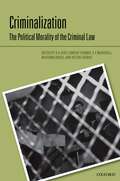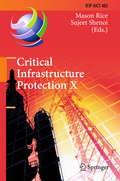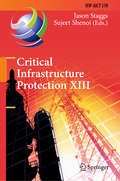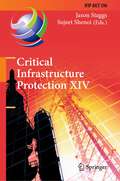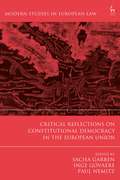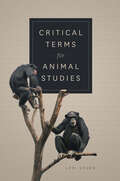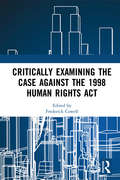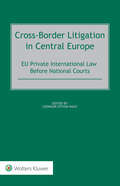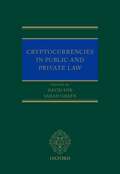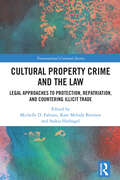- Table View
- List View
Criminalization: The Political Morality of the Criminal Law (Criminalization)
The Criminalization series arose from an interdisciplinary investigation into criminalization, focussing on the principles that might guide decisions about what kinds of conduct should be criminalized, and the forms that criminalization should take. Developing a normative theory of criminalization, the series tackles the key questions at the heart of the issue: what principles and goals should guide legislators in deciding what to criminalize? How should criminal wrongs be classified and differentiated? How should law enforcement officials apply the law's specifications of offences? The fourth book in the series examines the political morality of the criminal law, exploring general principles and theories of criminalization. Chapters provide accounts of the criminal law in the light of ambitious theories about moral and political philosophy - republicanism and contractarianism, or reflect upon on the success of important theories of criminalization by viewing them in a novel light. Ideas that are fundamental to any complete theory of the criminal law - liberty, harm, and the effect on victims - are investigated in depth. Sociological investigation of the criminal law grounds a critical investigation into the principles of criminalization, both as a legislative matter, and with respect to criminalization practices, in contemporary and historical contexts. The volume broadens our conceptions of the theory of criminalization, and clarifies the role of the series in the development of this theory. It is essential reading for all interested in legal, political, and social theories of criminalization.
The Criminalization of Violence Against Women: Comparative Perspectives (Interpersonal Violence)
Historically states have failed to seriously confront violence against women. In response, in many countries women's rights movements have called on the government to prioritize state intervention in cases involving violence between intimate partners, sexual harassment, rape, and sexual assault by both strangers and intimate partners. Those interventions have taken various forms, including the passage of substantive civil and criminal laws governing intimate partner violence, rape and sexual assault, and sexual harassment; the development of civil orders of protection; and the introduction of procedures in the criminal legal system to ensure the effective intervention of police and prosecutors. Indeed, many countries have relied upon intervention by the criminal legal system to meet their requirements under international human rights standards that obligate states to prevent, protect from, prosecute, punish, and provide redress for violence. Although states have taken divergent approaches to the passage and implementation of criminal laws and procedures to address violence against women, two things are clear: criminalization is a primary strategy relied upon by most nations, and yet criminalization is not having the desired impact. This collection explores the extent to which nations have adopted criminal legal reforms to address violence against women, the consequences associated with the implementation of those laws and policies, and who bears those consequences most heavily. The chapters examine the need for both more and less criminalization, ask whether we should think differently about criminalization, and explore the tensions that emerge when criminal law, civil law and social policy speak or fail to speak to each other. Drawing on criminalization approaches and recent debates from across the globe, this collection provides a comparative approach to assess the scope, impact of, and alternatives to criminalization in the response to violence against women.
Criminalizing Intimate Image Abuse: A Comparative Perspective
Intimate image abuse is a recent, endemic phenomenon which raises multiple legal issues and presents a significant challenge for the traditional institutions of law and criminal justice. The nature of this phenomenon requires considering the traditional complexities of regulating privacy, sexual offences, and cybercrimes, alongside the social and cultural issue of what may be considered 'intimate', 'private', or indeed 'sexual'. Since the harm experienced by victims of intimate image abuse is particularly serious and involves disparate legal interests, criminal law has been invoked as one of the solutions, but it is unclear what its role and limits should be. The law's approach should avoid any moralistic attitude, trying to achieve a balance between sexual autonomy and the protection of sexual privacy. At the same time, the needs of criminalization must be balanced with the traditional principles of criminal law. Criminalizing Intimate Image Abuse strives primarily to generate new conceptual and theoretical frameworks to address the legal responses to this phenomenon, by bringing together a number of scholars involved in the study of intimate image abuse over recent years. This volume compares the solutions developed in different legal systems. The perspective is mainly focused on the comparison between the Anglo-American criminalization model and that of continental Europe, but there are also overviews of the criminalization trends in Asian and Latin American countries. Once the criminalization of intimate image abuse, as well as its theoretical and practical limits, have been established, the analysis focuses on possible new legal strategies, complementary or alternative to traditional criminal justice, such as restorative justice. Finally, in order to achieve an effective safeguard for victim-survivors, the book deals with the role of Internet Service Providers and bystanders in preventing intimate image abuse.
Criminology as a Moral Science (Studies in Penal Theory and Ethics)
This book proposes an explicit recognition of criminology as a moral science: a philosophically textured appreciation of the presence and role of values in people's reasoning and motivation, set within an empirically rigorous social-scientific account. This endeavour requires input from both criminologists and philosophers, and careful dialogue between them. Criminology as a Moral Science provides such a dialogue, not least about the so-called 'fact-value distinction', but also about substantive topics such as guilt and shame. The book also provides philosophically-informed accounts of morality in practice in several criminological contexts: these include whistleblowing practices within a police service; the dilemmas of mothers about who and what to tell about a partner's imprisonment; and how persistent offenders begin to try to 'turn their lives around' to desist from crime. The issues raised go to the heart of some currently pressing topics within criminology, notably the development of 'evidence-based practice', which requires some kind of stable bridge to be built between research evidence ('facts') and proposals for policy ('evaluative recommendations').
Critical Adult Education in Food Movements
This book focuses on research that shows the importance of critical adult education for the spread of food sovereignty and agroecology to more people and places. It pays particular attention to the important role that learning, education and pedagogy can play in social transformation for food sovereignty and justice—an approach referred to broadly as “Learning for Transformation”. It reveals common dynamics and principles that critical education for food sovereignty share in different contexts. The book draws together 8 chapters that offer new critical insights about why, where, and how learning for transformation is being implemented,—and what next.Previously published in Agriculture and Human Values Volume 36, issue 3, September 2019Chapter “Transformative agroecology learning in Europe: building consciousness, skills and collective capacity for food sovereignty” is available open access under a Creative Commons Attribution 4.0 International License via link.springer.com.
Critical Infrastructure Protection X: 10th IFIP WG 11.10 International Conference, ICCIP 2016, Arlington, VA, USA, March 14-16, 2016, Revised Selected Papers (IFIP Advances in Information and Communication Technology #485)
The information infrastructure - comprising computers, embedded devices, networks and software systems - is vital to day-to-day operations in every sector: information and telecommunications, banking and finance, energy, chemicals and hazardous materials, agriculture, food, water, public health, emergency services, transportation, postal and shipping, government and defense. Global business and industry, governments, indeed society itself, cannot function effectively if major components of the critical information infrastructure are degraded, disabled or destroyed. Critical Infrastructure Protection describes original research results and innovative applications in the interdisciplinary field of critical infrastructure protection. Also, it highlights the importance of weaving science, technology and policy in crafting sophisticated, yet practical, solutions that will help secure information, computer and network assets in the various critical infrastructure sectors. Areas of coverage include: themes and issues; control systems security; infrastructure modeling and simulation; risk and impact assessment. This book is the tenth volume in the annual series produced by the International Federation for Information Processing (IFIP) Working Group 11.10 on Critical Infrastructure Protection, an international community of scientists, engineers, practitioners and policy makers dedicated to advancing research, development and implementation efforts focused on infrastructure protection. The book contains a selection of fourteen edited papers from the Tenth Annual IFIP WG 11.10 International Conference on Critical Infrastructure Protection, held at SRI International, Arlington, Virginia, USA in the spring of 2016. Critical Infrastructure Protection is an important resource for researchers, faculty members and graduate students, as well as for policy makers, practitioners and other individuals with interests in homeland security.
Critical Infrastructure Protection XIII: 13th IFIP WG 11.10 International Conference, ICCIP 2019, Arlington, VA, USA, March 11–12, 2019, Revised Selected Papers (IFIP Advances in Information and Communication Technology #570)
The information infrastructure – comprising computers, embedded devices, networks and software systems – is vital to operations in every sector: chemicals, commercial facilities, communications, critical manufacturing, dams, defense industrial base, emergency services, energy, financial services, food and agriculture, government facilities, healthcare and public health, information technology, nuclear reactors, materials and waste, transportation systems, and water and wastewater systems. Global business and industry, governments, indeed society itself, cannot function if major components of the critical information infrastructure are degraded, disabled or destroyed. Critical Infrastructure Protection XIII describes original research results and innovative applications in the interdisciplinary field of critical infrastructure protection. Also, it highlights the importance of weaving science, technology and policy in crafting sophisticated, yet practical, solutions that will help secure information, computer and network assets in the various critical infrastructure sectors. Areas of coverage include: Themes and Issues; Infrastructure Protection; Vehicle Infrastructure Security; Telecommunications Infrastructure Security; Cyber-Physical Systems Security; and Industrial Control Systems Security. This book is the thirteenth volume in the annual series produced by the International Federation for Information Processing (IFIP) Working Group 11.10 on Critical Infrastructure Protection, an international community of scientists, engineers, practitioners and policy makers dedicated to advancing research, development and implementation efforts focused on infrastructure protection. The book contains a selection of sixteen edited papers from the Thirteenth Annual IFIP WG 11.10 International Conference on Critical Infrastructure Protection, held at SRI International, Arlington, Virginia, USA in the spring of 2019. Critical Infrastructure Protection XIII is an important resource for researchers, faculty members and graduate students, as well as for policy makers, practitioners and other individuals with interests in homeland security.
Critical Infrastructure Protection XIV: 14th IFIP WG 11.10 International Conference, ICCIP 2020, Arlington, VA, USA, March 16–17, 2020, Revised Selected Papers (IFIP Advances in Information and Communication Technology #596)
The information infrastructure – comprising computers, embedded devices, networks and software systems – is vital to operations in every sector: chemicals, commercial facilities, communications, critical manufacturing, dams, defense industrial base, emergency services, energy, financial services, food and agriculture, government facilities, healthcare and public health, information technology, nuclear reactors, materials and waste, transportation systems, and water and wastewater systems. Global business and industry, governments, indeed society itself, cannot function if major components of the critical information infrastructure are degraded, disabled or destroyed.Critical Infrastructure Protection XIV describes original research results and innovative applications in the interdisciplinary field of critical infrastructure protection. Also, it highlights the importance of weaving science, technology and policy in crafting sophisticated, yet practical, solutions that will help secure information, computer and network assets in the various critical infrastructure sectors. Areas of coverage include: Aviation Infrastructure Security; Vehicle Infrastructure Security; Telecommunications Systems Security; Industrial Control Systems Security; Cyber-Physical Systems Security; and Infrastructure Modeling and Simulation. This book is the fourteenth volume in the annual series produced by the International Federation for Information Processing (IFIP) Working Group 11.10 on Critical Infrastructure Protection, an international community of scientists, engineers, practitioners and policy makers dedicated to advancing research, development and implementation efforts focused on infrastructure protection. The book contains a selection of sixteen edited papers from the Fourteenth Annual IFIP WG 11.10 International Conference on Critical Infrastructure Protection, held at SRI International, Arlington, Virginia, USA in the spring of 2020. Critical Infrastructure Protection XIV is an important resource for researchers, faculty members and graduate students, as well as for policy makers, practitioners and other individuals with interests in homeland security.
Critical Infrastructure Protection XVI: 16th IFIP WG 11.10 International Conference, ICCIP 2022, Virtual Event, March 14–15, 2022, Revised Selected Papers (IFIP Advances in Information and Communication Technology #666)
The information infrastructure – comprising computers, embedded devices, networks and software systems – is vital to operations in every sector: chemicals, commercial facilities, communications, critical manufacturing, dams, defense industrial base, emergency services, energy, financial services, food and agriculture, government facilities, healthcare and public health, information technology, nuclear reactors, materials and waste, transportation systems, and water and wastewater systems. Global business and industry, governments, indeed society itself, cannot function if major components of the critical information infrastructure are degraded, disabled or destroyed.Critical Infrastructure Protection XVI describes original research results and innovative applications in the interdisciplinary field of critical infrastructure protection. Also, it highlights the importance of weaving science, technology and policy in crafting sophisticated, yet practical, solutions that will help secure information, computer and network assets in the various critical infrastructure sectors. Areas of coverage include: Industrial Control Systems Security; Telecommunications Systems Security; Infrastructure Security.This book is the 16th volume in the annual series produced by the International Federation for Information Processing (IFIP) Working Group 11.10 on Critical Infrastructure Protection, an international community of scientists, engineers, practitioners and policy makers dedicated to advancing research, development and implementation efforts focused on infrastructure protection. The book contains a selection of 11 edited papers from the Fifteenth Annual IFIP WG 11.10 International Conference on Critical Infrastructure Protection, held as a virtual event during March, 2022.Critical Infrastructure Protection XVI is an important resource for researchers, faculty members and graduate students, as well as for policy makers, practitioners and other individuals with interests in homeland security.
Critical Reflections on Constitutional Democracy in the European Union (Modern Studies in European Law)
This book takes a wide-ranging approach to tackle the complex question of the current state of constitutional democracy in the EU. It brings together a broad set of academics and practitioners with legal and political perspectives to focus on both topical and perennial issues concerning constitutional democracy (including safeguarding the rule of law and respect for fundamental rights) in theory and practice, primarily at EU level but also with due regard to national and global developments. This approach underlines that rather than a single problématique to be analysed and resolved, we are presently facing a kaleidoscopic spectrum of related challenges that influence each other in elusive, multifaceted ways. Critical Reflections on Constitutional Democracy in the European Union offers a rich analysis of the issues as well as concrete policy recommendations, which will appeal to scholars and practitioners, students and interested citizens alike. It provides a meaningful contribution to the array of existing scholarship and debate by proposing original elements of analysis, challenging often-made assumptions, destabilising settled understandings and proposing fundamental reforms. Overall, the collection injects a set of fresh critical perspectives on this fundamental issue that is as contemporary as it is eternal.
Critical Terms for Animal Studies (Critical Terms)
Animal Studies is a rapidly growing interdisciplinary field devoted to examining, understanding, and critically evaluating the complex relationships between humans and other animals. Scholarship in Animal Studies draws on a variety of methodologies to explore these multi-faceted relationships in order to help us understand the ways in which other animals figure in our lives and we in theirs. Bringing together the work of a group of internationally distinguished scholars, the contribution in Critical Terms for Animal Studies offers distinct voices and diverse perspectives, exploring significant concepts and asking important questions. How do we take non-human animals seriously, not simply as metaphors for human endeavors, but as subjects themselves? What do we mean by anthropocentrism, captivity, empathy, sanctuary, and vulnerability, and what work do these and other critical terms do in Animal Studies? Sure to become an indispensable reference for the field, Critical Terms for Animal Studies not only provides a framework for thinking about animals as subjects of their own experiences, but also serves as a touchstone to help us think differently about our conceptions of what it means to be human, and the impact human activities have on the more than human world.
Critically Examining the Case Against the 1998 Human Rights Act
Since its inception in 1998 the Human Rights Act (HRA) has come in for a wide variety of criticism on legal, constitutional, political and cultural grounds. More recently, this criticism escalated significantly as politicians have seriously considered proposals for its abolition. This book examines the main arguments against the HRA and the issues which have led to public hostility against the protection of human rights. The first part of the book looks at the legal structures and constitutional aspects of the case against the HRA, including the criticism that the HRA is undemocratic and is used by judges to subvert the will of parliament. The second part of the book looks at specific issues, such as immigration and terrorism, where cases involving the HRA have triggered broader public concerns about the protection of human rights. The final section of this book looks at some of the structural issues that have generated hostility to the HRA, such as media coverage and the perception of the legal profession. This book aims to unpick the complex climate of hostility that the HRA has faced and examine the social, political and legal forces that continue to inform the case against the HRA.
Critically Examining the Case Against the 1998 Human Rights Act
Since its inception in 1998 the Human Rights Act (HRA) has come in for a wide variety of criticism on legal, constitutional, political and cultural grounds. More recently, this criticism escalated significantly as politicians have seriously considered proposals for its abolition. This book examines the main arguments against the HRA and the issues which have led to public hostility against the protection of human rights. The first part of the book looks at the legal structures and constitutional aspects of the case against the HRA, including the criticism that the HRA is undemocratic and is used by judges to subvert the will of parliament. The second part of the book looks at specific issues, such as immigration and terrorism, where cases involving the HRA have triggered broader public concerns about the protection of human rights. The final section of this book looks at some of the structural issues that have generated hostility to the HRA, such as media coverage and the perception of the legal profession. This book aims to unpick the complex climate of hostility that the HRA has faced and examine the social, political and legal forces that continue to inform the case against the HRA.
Cross-Border Litigation in Central Europe: EU Private International Law Before National Courts
Cross-Border Litigation in Central Europe EU Private International Law Before National Courts As a consequence of the ever-increasing intercourse within the enlarged and diverse European Union (EU), a growing number of businesses, consumers, and families rely on EU private international law instruments to seek justice in cross-border disputes. This invaluable reference book offers an in-depth understanding of this process in Central Europe and is the first to provide a comprehensive and analytical overview of the judicial practice in the region and to make this case law accessible in English. Presenting the results of a major EU-funded project (CEPIL), the book offers an insight into the reality of EU private international law and cross-border litigation in Central Europe: it provides a comprehensive and exhaustive presentation of the case law in 10 Central European Member States (Croatia, the Czech Republic, Estonia, Hungary, Latvia, Lithuania, Poland, Romania, Slovakia, and Slovenia); it covers all fields of EU private international law (general civil and commercial, insolvency, family and succession matters); it inquires whether EU private international law functions optimally in the Central European Member States in order to secure a Europe of law and justice; it examines whether EU private international law instruments are applied in a correct and uniform manner and whether national courts deal appropriately with disputes having a cross-border element; it analyzes whether the current legal and institutional architecture is susceptible of securing legal certainty and an effective remedy for cross-border litigants. This important practical resource helps businesses, consumers, families and legal counsels engaged in cross-border mobility to gain access to essential information and analysis as to the application and interpretation of EU private international law in Central Europe. The book is also highly valuable to academics and researchers specializing in private international law by presenting the research findings of the CEPIL project.
Cryptoassets: Legal, Regulatory, and Monetary Perspectives
Cryptoassets represent one of the most high profile financial products in the world, and fastest growing financial products in history. From Bitcoin, Etherium and Ripple's XRP-so called "utility tokens" used to access financial services-to initial coin offerings that in 2017 rivalled venture capital in money raised for startups, with an estimated $5.6 billion (USD) raised worldwide across 435 ICOs. All the while, technologists have hailed the underlying blockchain technology for these assets as potentially game changing applications for financial payments and record-keeping. At the same time, cryptoassets have produced considerable controversy. Many have turned out to be lacklustre investments for investors. Others, especially ICOs, have also attracted noticeable fraud, failing firms, and alarming lapses in information-sharing with investors. Consequently, many commentators around the world have pressed that ICO tokens be considered securities, and that concomitant registration and disclosure requirements attach to their sales to the public. This volume assembles an impressive group of scholars, businesspersons and regulators to collectively write on cryptoassets. This volume represents perspectives from across the regulatory ecosystem, and includes technologists, venture capitalists, scholars, and practitioners in securities law and central banking.
Cryptocurrencies in Public and Private Law
This book examines how cryptocurrencies based on blockchain technologies fit into existing general law categories of public and private law. The book takes the common law systems of the United Kingdom as the centre of its study but extends beyond the UK to show how cryptocurrencies would be accommodated in some Western European and East Asian legal systems outside the common law tradition. By investigating traditional conceptions of money in public law and private law the work examines the difficulties of fitting cryptocurrencies within those approaches and models. Fundamental questions regarding issues of ownership, transfer, conflict of laws, and taxation are addressed with a view to equipping the reader with the tools to answer common transactional questions about cryptocurrencies. The international contributor team uses the common law systems of the United Kingdom as a basis for the analysis, but also looks comparatively to other systems across the wider common law and civil law world to provide detailed examination of the legal problems encountered.
The Cuba-U.S. Bilateral Relationship: New Pathways and Policy Choices
At the end of President Barack Obama's second term, it seemed that the U.S. and Cuba might be on track to normalize relations after five decades of cold war animus. These hopes appeared dashed, however, by the results of the 2016 U.S. presidential election, which brought to power a candidate that campaigned on undoing Obama's signature policies, including the rapprochement with Cuba. Several years into the Trump administration there are still several pathways that these two neighboring countries could take to either continue the rapprochement, extend the status quo, or drift further apart. Although it is not entirely clear which direction the bilateral relationship will take, given the varied and divergent political pressures that drive each of the two nations, it is clear that several key opportunities and challenges await them. Drawing insight from the political, economic, and legal spheres, this book examines possible pathways for the two cold war adversaries. Key among the issues that demand attention are unresolved property claims dating back to the 1959 revolution, establishing regularized bilateral economic relationships in multiple sectors of the economy, as well as addressing a variety of legal and political constraints in both Cuba and the United States. This volume tackles these issues by drawing on the expertise of scholars in three distinct fields--political science, economics, and law--while positing viable policy choices and the opportunities and challenges found therein.
The Culpable Corporate Mind
This collection examines critically, and with an eye to reform, conceptions and conditions of corporate blameworthiness in law. It draws on legal, moral, regulatory and psychological theory, as well as historical and comparative perspectives. These insights are applied across the spheres of civil, criminal, and international law.The collection also has a deliberate focus on the 'nuts and bolts' of the law: the legal, equitable and statutory principles and rules that operate to establish corporate states of mind, on which responsibility as a matter of daily legal practice commonly depends.The collection therefore engages strongly with scholarly debates.The book also speaks, clearly and cogently, to the judges, regulators, legislators, law reform commissioners, barristers and practitioners who administer and, through their respective roles, incrementally influence the development of the law at the coalface of legal practice.
Cultivating Virtue in the University
Across the globe, educators are grappling with how best to prepare a new generation to engage the challenges and opportunities of the twenty-first century. Along with knowledge and skills, many are now emphasizing the importance of character. Yet, while there has been a robust movement to educate character among children and adolescents, much less attention has been given to the ethical formation of college and university students. What is the role of colleges and universities in educating the character of students? Should universities even attempt to cultivate virtue? If so, how can they do so effectively in a pluralistic context? Cultivating Virtue in the University seeks to answer these questions by gathering diverse perspectives on character education within twenty-first century universities. With essays from some of the world's leading scholars, this volume catalyzes a critical debate about the possibilities and limits of character education in the university while offering theoretical and practical perspectives on what such education could look like in increasingly global and intercultural institutions. By engaging insights from education, history, literature, philosophy, psychology, sociology, and theology, the volume encourages scholars and educators to embrace the opportunities and challenges of cultivating virtue in the university.
Cultural Property Crime and the Law: Legal Approaches to Protection, Repatriation, and Countering Illicit Trade (Transnational Criminal Justice)
This book explores innovative approaches to using and operating within and around both criminal law and civil law in the detection, investigation, and restitution of illicit cultural property.The volume brings together a wide range of authors who research and work in combatting cultural property crime. It explores the normative tensions and intersections between civil and criminal law and where they complement each other in the field. It focuses on innovative legal solutions to the unique challenges presented when facing a transnational form of crime that must consider varying structures of law and order, as well as a deep understanding of the heritage in question, both in past and the present cultures. The collection examines what both areas of law contribute to preventing cultural property crime from occurring, holding offenders responsible before the law, and returning objects to their rightful owners and/or places of origin. Combining the perspectives of academics and practitioners, the volume highlights voices from around the globe, using this range of experience to explore new ideas and applications of legal theory and practice to cases involving cultural property crimes.The book will be of interest to academics and practitioners in cultural property crime in the fields of criminology, law, archaeology, museum studies, political science, economics, and law enforcement.
Culture, Secularization, and Democracy: Lessons from Alexis de Tocqueville (ISSN)
Following the approach developed by Alexis de Tocqueville, this volume views democracy as a cultural phenomenon. It starts from the assumption that if we are to adequately address concerns about the current state and future of modern Western democracies, we need first to tackle the cultural preconditions necessary for the functioning of a democracy.Since Tocqueville’s time, the book takes the most crucial change in the West to be ‘double secularisation’. Here, this concerns, first, the diminished influence of organised Christianity. Even though secularity was partly a product of Christianity, secularisation is highly significant in terms of the cultural underpinnings of Western democracy. Second, it involves a decreased interest in and knowledge of classical philosophy.Chapters on secularity, family life, civic life, and public spirit focus on central elements of the changed cultural foundation of democracy, exploring issues such as identity politics, the public space, and the role of human rights and natural law in a pluralistic and resilient democracy. The volume concludes with a closer look at the implications of current presentism, that is, the view that only the present counts for the legitimacy and effectiveness of democratic systems. Finally, it asks if double secularisation can also offer fresh opportunities for promoting the conditions of a viable democracy.The book will be of interest to academics and researchers working in the areas of law and religion, constitutional law, political science, history, and philosophy.
Cyber War: Law and Ethics for Virtual Conflicts (Ethics, National Security, and the Rule of Law)
Cyber weapons and cyber warfare have become one of the most dangerous innovations of recent years, and a significant threat to national security. Cyber weapons can imperil economic, political, and military systems by a single act, or by multifaceted orders of effect, with wide-ranging potential consequences. Unlike past forms of warfare circumscribed by centuries of just war tradition and Law of Armed Conflict prohibitions, cyber warfare occupies a particularly ambiguous status in the conventions of the laws of war. Furthermore, cyber attacks put immense pressure on conventional notions of sovereignty, and the moral and legal doctrines that were developed to regulate them. This book, written by an unrivalled set of experts, assists in proactively addressing the ethical and legal issues that surround cyber warfare by considering, first, whether the Laws of Armed Conflict apply to cyberspace just as they do to traditional warfare, and second, the ethical position of cyber warfare against the background of our generally recognized moral traditions in armed conflict. The book explores these moral and legal issues in three categories. First, it addresses foundational questions regarding cyber attacks. What are they and what does it mean to talk about a cyber war? The book presents alternative views concerning whether the laws of war should apply, or whether transnational criminal law or some other peacetime framework is more appropriate, or if there is a tipping point that enables the laws of war to be used. Secondly, it examines the key principles of jus in bello to determine how they might be applied to cyber-conflicts, in particular those of proportionality and necessity. It also investigates the distinction between civilian and combatant in this context, and studies the level of causation necessary to elicit a response, looking at the notion of a 'proximate cause'. Finally, it analyses the specific operational realities implicated by particular regulatory regimes. This book is unmissable reading for anyone interested in the impact of cyber warfare on international law and the laws of war.
Damages for Non-Pecuniary Loss in a Comparative Perspective (Tort and Insurance Law #2)
Damagesfornon-pecuniarylossarethesubjectofwidespreadinterestinEu rope. TheywerechosenasoneoftheinitialprojectsoftheCentreforTortand InsuranceLaw,Vienna. TheCentreisbynomeansthefirstinthefieldinexam l iningthistopic butourexercisehassoughttoplacetheprobleminthebroader frameworkofthevariouslegalsystemsandtogobeyondtheusualcontextof personalinjurybyaccident. Thecomparativereportismainlybaseduponin formation suppliedbycolleagues in 10Europeancountries. Theworking methodwasaquestionnaireissuedinthesummerof1999,onthebasisofwhich thereweretendetailedcountryreportswhicharepublishedinthisvolume. However,informationhasalsobeenincludedfromPortugal,SouthAfrica,Swe den,theUnitedStatesandIsrael. TheIsraelireportisalsopublishedinanap pendixinthisvolume. Colleaguesfromthosecountriessuppliedmaterialdur ing anexercisein 1999bytheEuropeanGrouponTortLawonthelawof damagesingeneral,directedbyProfessorUlrichMagnus(reportforthcoming). ApreliminarycomparativereportwasmadetoameetinginMunichon28and 29April2000attendedbypersonswhohadsuppliedcountryreports,other membersoftheEuropeanGrouponTortLawandbyrepresentativesofMunich Reinsurance,whohavesupportedtheCentreandshownacloseinterestinthis project. Adraftfinal reportwaspresentedatasymposiuminMunichon 13 October2000hostedbyMunichReandattendedbylawyersandinsurersfrom awiderangeofEuropeancountries. Dr. StefanHeydofMunichReandProfes sorPierreTercieroftheUniversityofFribourgalsoaddressedthesymposium andtheircontributionsareincludedinthisvolume(seeXlIIandAppendix2). Thefinalcomparativereportowesmuchtothediscussionsatboththemeet ingsinMunich. Finally,weexpressourgratitudeforthemostvaluablehelpof Dr. SabineGantner,DonnaStockenhuberM. AandDr. FriedrichPoppinprepar ingthemanuscriptforthepublisher. 2 W. V. H. Rogers,December2000 I SeeinparticularthebooksofPfennigstorfandofMcIntoshandHolmes on personal injurydamages inEurope andthe workfor theEuropeanParliamentoftheGroupco ordinatedbyProf. BusnelliofPisa(who has contributed to this volume). 2 Thelaw moves on. Sincethematerialwas submittedfor presstherehavebeen "expansive"movements in England on privacyandexemplary damages. No doubt othersystemshavealsoseenchanges. Butlawbooksareinevitablysnapshots. TableofContents WelcomeSpeechfromthe"DamagesforNon-PecuniaryLossinEurope" Meeting(S. Heyd) XIII Questionnaire. . . . . . •. . . . . . •. . •. . . . •. . . . . . . . . . . . . . . . . . •. . . . . . . . . . . . . •. . . . •. . •. . . . •. ••. . . . . . . . . . . . •. . •. . . ••. . •. . . . •. . . . . . . XV ListofContributors. . . . . . . . . . . . . . . . . . . . . •. . ••. . . . . . . . . . . . . . . . . . . . . . . . . . •. . . •. . . . ••. . . . . . . •. . . . •. . . . •. . . . . . . •. . . . . . . XX CountryReports. . •. . . . . . . . . . . . . . . . . . . . . . . . •••. . •. . . . . . . . . . . •. ••••. •. . . . ••. •. . . . •. . . . . . . . . . . . . . . . . . . . . •. . . •. . . . . . . . . •. . •. . 1 Austria(E. KarnerandH. Koziol)••••••••••••. ••••••••••••••••••••. •••••••••••••••••••••••••••••••••••••••1 I. General. . . . . . . . . . . . . . •. . . . •. . . . . •. . . . . . . •. . . . . . . . . . •••. . . . . . . . . •. . . . . . . . ••. •. . . . . •. . . . •. . . . . . . . . . . . •. . . . . •. . . . . . . . . 1 II. PersonalInjuryandDeath. . . . . . . . . . . . . . . •. . •. .. . . . . . . . . . . . . . . . •. . . . . . . . . . •. . . . •. . . . . . . . . . . . . •. . . . •. . 4 General 4 SpecificCases c••••••••••••••••••••••••14 Refonn 15 III. Non-PersonalInjuryCases. . •. . . . . . . . . . . . . . . . . . . . . . . . . . . . . . . . . . . . . •. . . . . . . . . . . . . . . . . . . . . •. . •. . . . . . . 16 General 16 SpecificCases 24 Belgium(H. CousyandD. Droshout) 28 I. General. . . . . . . . . . . . . . . . . . . . . . . . . . . . . . . . . . . •. . . . . . . . . . . . . . . . . . •. . •. . . . . . . . . . . . •. . . . . . . . . . •. . . . . . . •. . . . . . . . . . . . . . . . 28 II. PersonalInjuryandDeath. . . . . . . •. . . . . . . . . . . . . . . . . . •. . . . . . . •. . . . . . . . •. . . . ••. . . . . . •. . . . . . . . •. . . . . . .
Das Risiko – Gedanken übers und ins Ungewisse: Interdisziplinäre Aushandlungen des Risikophänomens im Lichte der Reflexiven Moderne. Eine Festschrift für Wolfgang Bonß.
In dieser Festschrift haben sich Expertinnen und Experten unterschiedlichster Disziplinen zusammengeschlossen, um das Risiko an sich und Risikophänomene wie Terror, Klimawandel, aber auch die zunehmende Spannung zwischen Sicherheit und Freiheit zu beschreiben und zu erklären und die Annahmen der Theorie Reflexiver Modernisierung vor diesem Hintergrund kritisch zu reflektieren. Je nachdem ob Sozial-, Natur- oder Ingenieurwissenschaftler Risiken analysieren, werden diese uneinheitlich verstanden und die daraus abgeleiteten Erkenntnisse unterscheiden sich. Dennoch ist eines gewiss: Unsicherheiten sind ein Grundtatbestand jeglichen menschlichen Lebens; und es spricht vieles für ihre stete Zunahme in der Zukunft. In diesem Sinne plädiert Wolfgang Bonß – einer der führenden Vordenker der modernen Risikoforschung – für eine neue Unsicherheitskultur, für die Anerkennung der Ungewissheit als „Normalität“.
Data and Private Law (Hart Studies in Private Law)
This collection examines one of the fastest growing fields of regulation: data rights.The book moves debates about data beyond data and privacy protecting statutes. In doing so, it asks what private law may have to say about these issues and explores how private law may influence the interpretation and the form of legislation dealing with data. Over five parts it: sets out an overview of the themes and problems; explores theoretical justifications and challenges in understanding data; considers data through the perspective of cognate private law doctrines; assesses the contribution of private law in understanding individual rights; and finally examines the potential of private law in providing individual remedies for wrongful data use, supplementing the work of regulators. The contributors are specialists in their respective fields of private law with long-standing expertise in the challenges to data privacy posed by emerging digital technologies.
